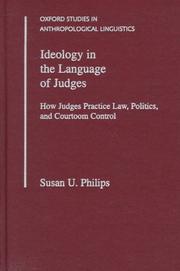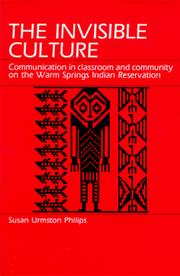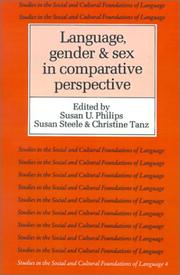| Listing 1 - 3 of 3 |
Sort by
|

ISBN: 019802732X 9786610535088 1280535083 1282384236 9786612384233 0195354427 9780198027324 6610535086 9780195113402 0195113403 0195113403 9780195113419 0195113411 9781280535086 9781282384231 6612384239 9780195354423 0197721729 Year: 2023 Volume: 17 Publisher: New York ; Oxford University Press,
Abstract | Keywords | Export | Availability | Bookmark
 Loading...
Loading...Choose an application
- Reference Manager
- EndNote
- RefWorks (Direct export to RefWorks)
Studying the language of judges in courtrooms, the author of this text demonstrates that they are not impartial arbiters of due process, but are influenced by their own politico-ideological stance and interpretation of the law.
Judges --- Judicial process --- Law --- Language, Legal --- Legal language --- Legal style --- Style, Legal --- Bill drafting --- Law and politics --- Political aspects. --- Language. --- Language --- Political aspects

ISBN: 9780881336948 0881336947 Year: 1993 Publisher: Prospect Heights (Ill.): Waveland Press,
Abstract | Keywords | Export | Availability | Bookmark
 Loading...
Loading...Choose an application
- Reference Manager
- EndNote
- RefWorks (Direct export to RefWorks)

ISBN: 0521338077 0521328497 0511621914 9780511621918 Year: 1987 Publisher: Cambridge : Cambridge University Press,
Abstract | Keywords | Export | Availability | Bookmark
 Loading...
Loading...Choose an application
- Reference Manager
- EndNote
- RefWorks (Direct export to RefWorks)
Most studies of gender differences in language use have been undertaken from exclusively either a sociocultural or a biological perspective. By contrast, this innovative volume places the analysis of language and gender in the context of a biocultural framework, examining both cultural and biological sources of gender differences in language, as well as the interaction between them. The first two parts of the volume on cultural variation in gender-differentiated language use, comparing Western English-speaking societies with societies elsewhere in the world. The essays are distinguished by an emphasis on the syntax, rather than style or strategy, of gender-differentiated forms of discourse but also often carry out the same forms differently through different choices of language form. These gender differences are shown to be socially organized, although the essays in Part I also raise the possibility that some cross-cultural similarities in the ways males and females differentially use language may be related to sex-based differences in physical and emotional makeup. Part III examines the relationship between language and the brain and shows that although there are differences between the ways males and females process language in the brain, these do not yield any differences in linguistic competence or language use. Taken as a whole, the essays reveal a great diversity in the cultural construction of gender through language and explicity show that while there is some evidence of the influence of biologically based sex differences on the language of women and men, the influence of culture is far greater, and gender differences in language use are better accounted for in terms of culture than in terms of biology. The collection will appeal widely to anthropologists, psychologists, linguists, and other concerned with the understanding of gender roles.
Sociology of the family. Sociology of sexuality --- Ethnology. Cultural anthropology --- Sociolinguistics --- Children --- Language and languages --- #SBIB:309H518 --- 800:316 --- 800:316 Sociolinguistiek --- Sociolinguistiek --- Language and sex --- Sexism in language --- Biolinguistics --- Neurophysiology --- Language development in children --- Interpersonal communication in children --- Language --- Physiological aspects --- Sex differences --- Verbale communicatie: sociologie, antropologie, sociolinguistiek --- Vocabulary --- Language. --- Physiological aspects. --- Sex differences. --- Social Sciences --- Anthropology
| Listing 1 - 3 of 3 |
Sort by
|

 Search
Search Feedback
Feedback About UniCat
About UniCat  Help
Help News
News